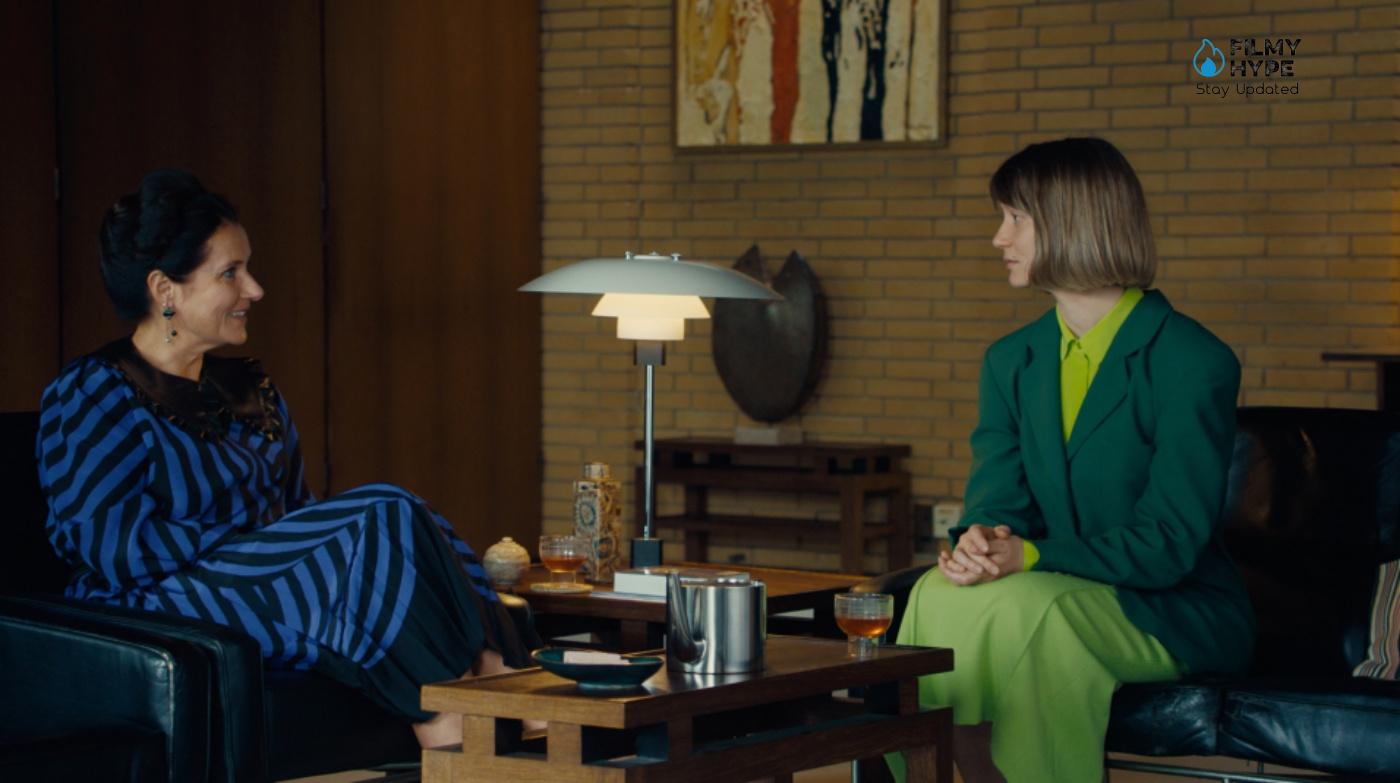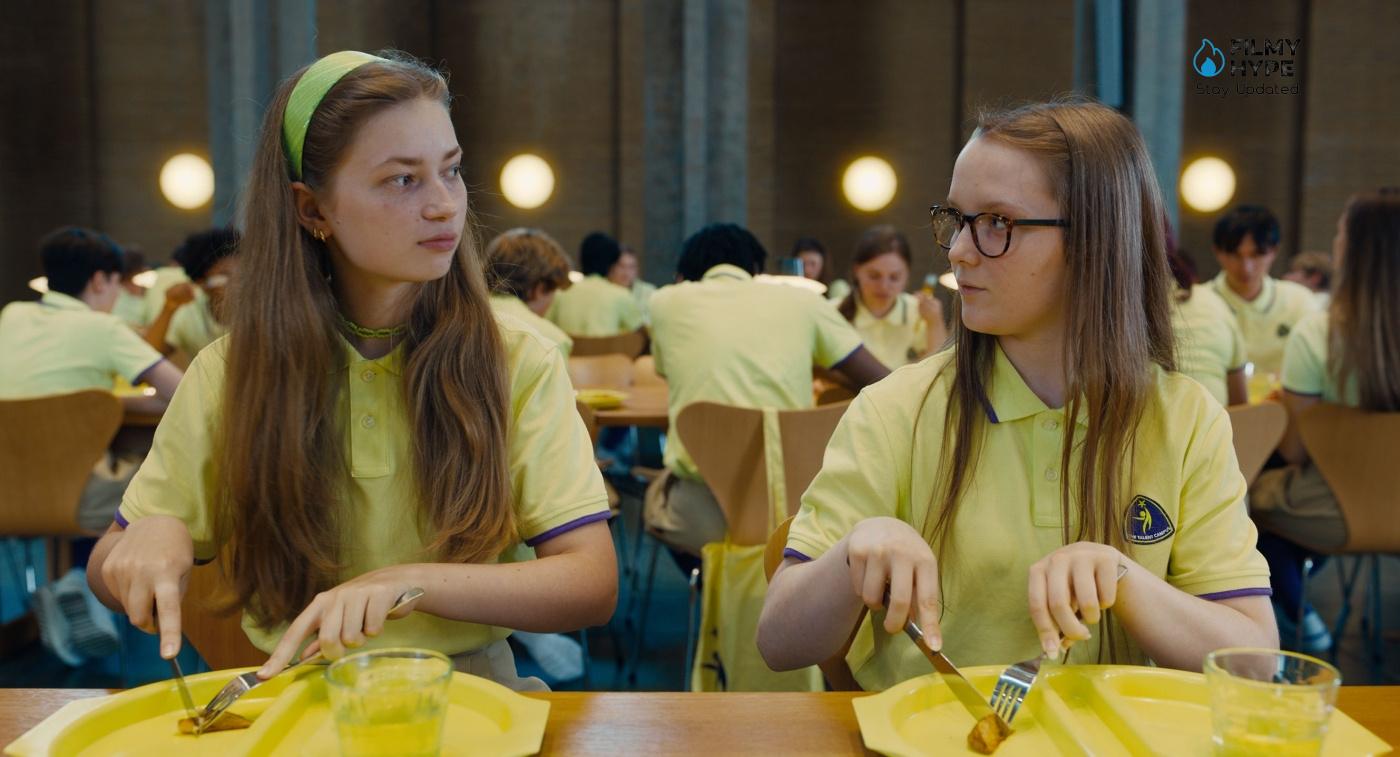‘Club Zero’ Review (Cannes): A Critique of Contemporary Society | Cannes Film Festival
Cast: Mia Wasikowska, Ksenia Devriendt, Luke Barker, Samuel D. Anderson
Director: Jessica Hausner
Where We Watched: Cannes Film Festival
Filmyhype.com Ratings: 3/5 (three stars)
Great expectations at the 76th Cannes Film Festival for Club Zero, the latest effort by acclaimed director Jessica Hausner, this year in the running for the coveted Palme d’Or. Yes, because the filmmaker from Vienna is now at home in Cannes, where she has presented world premieres of practically all the latest films she has made. If, therefore, only four years ago, in Little Joe (for which the protagonist Emily Beecham was awarded as best actress) we wondered what would happen to society if we managed to find a way to finally be forever happy, here in Club Zero a careful and ruthless social investigation is carried out, as current as more than ever satirical and disenchanted.

The Austrian Jessica Hausner has been linked to the Croisette since her debut, the diploma film Inter-View, special mention at the Cinéfondation in 1999, then among others Lovely Rita at Un Certain Regard in 2001 and the baptism in competition Joe in 2019, earned the award to actress Emily Beecham. The second for La Palma is Club Zero, again written with Géraldine Bajard, which finalizes many of Hausner’s usual themes, from reflection on institutions to the focus on individual freedoms, even a certain amount of biopolitics and a focus on belief (remember Lourdes?), with a rarefied, paratactic, indeed highly studied form that associates human and diorama, action and contemplation.
Club Zero Review: The Story Plot
At the center of this story, we find Miss Novak (Mia Wasikowska), a teacher recently hired in a prestigious English boarding school to introduce young children to “eating consciously”. Participants enroll in his course for different reasons: some would like to improve their sports performance, those who think about the environment and the future of the planet, those who do it to feel good about themselves, and those who simply would like some more credits to get a scholarship. If the lessons begin in a rather innocuous way, that is with the teaching of techniques to approach meals in a more conscious and informed way, over time Miss Novak pushes the young students to demonize food more and more. Among them, some are more susceptible to indoctrination – like the young Elsa (Ksenia Devriendt), already bulimic.

To what extremes can these kids who refuse to eat go? What is Miss Novak’s purpose? With disturbing atmospheres that are increasingly similar to those of the thriller – more than the satirical black comedy – Jessica Hausner forces us to follow the progressive descent into the hell of her protagonists, who will lose more and more contact, as well as with their parents and other adults, even with the reality that surrounds them, coming to believe that they will gain access to another world, idyllic, if only they continue not to eat.
Club Zero Review and Analysis
To make everything even more disturbing, the reaction of the adults around them: from the most careless to those who completely misrepresent the situation, allowing Miss Novak to have free access to their children. The only one who seems to notice what is happening is Ben’s mother, acronyms and from the economic situation not even remotely comparable to that of the other parents, she doesn’t have the tools to help the young victims. Those who would have them realize too late that they have to do something, are more concerned with admitting their mistake in having hired the woman than with protecting their children. And it is in this that Hausner’s critique of today’s society becomes more ferocious and effective, recounting a class of privileged people blinded by their false do-gooders and ostentatious (but false) open-mindedness.
Jessica Hausner starts from an entirely contemporary obsession with healthy eating, with diets – which can no longer be called diets, but principles of healthy eating – which nowadays seem to have become the key to a better life. In a world that scares us, and that is beyond our control, being able to control what we ingest seems to be the best key to being able to improve the present, not only our physical appearance and the health of our body but also that of the rest of the planet (threatened by excessive consumerism). However, the mask of health consciousness in Hausner’s film quickly collapses, revealing the eating behaviors of the protagonists for what they are, namely the “dear old” and simple anorexia. The further step of the author is to compare the anorexia indoctrination implemented by Miss Novak to what happens in the context of a cult: the protagonists are separated from their peers and from those who love them, and they are made to believe that they are special and that, by behaving in a certain way, they will be the only ones chosen to have access to a new, happier world.

Mia Wasikowska works very well in the role of spiritual leader, calm, authoritarian, and devoted to practices such as yoga, meditation, and spiritual beliefs towards an unidentified mother deity. In her exasperated kindness, the actress infuses the character with a progressively more sinister and disturbing air. The effectiveness of the message that the author wants to spread, however, is lost as we anticipated in the formalisms that dot the film: the exasperated slowness of certain sequences and dialogues, just to give an example, only strips the story of naturalness, making it so less incisive what Hausner would like to convey to us. Certain situations seemed more like an exercise in style for its own sake (looking for a Wes Anderson-esque aesthetic) than the biting criticism that a film like this requires. The ferocity of some scenes, and we are referring in particular to the one starring the young Elsa, briefly refocuses the author’s intentions, but it is not sufficient to redeem the entire film and make it more cutting and significant.
Club Zero Review: The Last Words
Possible worlds, because ours is impossible, and Hausner after Joe continues to frame the escape if not the solution, with ideological merit and existential urgency. But once the intentions have been exhausted, even fulfilled, the thinking and feeling of psychological drama open up to aporias and irresolution, and the rarefied and artificial construction of the decor and the painting reveal cracks. There is a lack of seriousness, which does not mean missing answers, but last but not least questions not taken to extreme consequences: the diorama lacks depth, the apologue – sorry – the flesh, the gaze the radicality. Put on the poetic balance, absit iniuria verbis, Club Zero is lightweight. And it comes to mind, a mountain that gave birth to a rat, Joe: where is the substance, better, where is the consistency? The criticism of contemporary society implied by the film is not as fierce as its author would like, but Mia Wasikowska is very good in the role of spiritual leader, disturbing and sinister.






